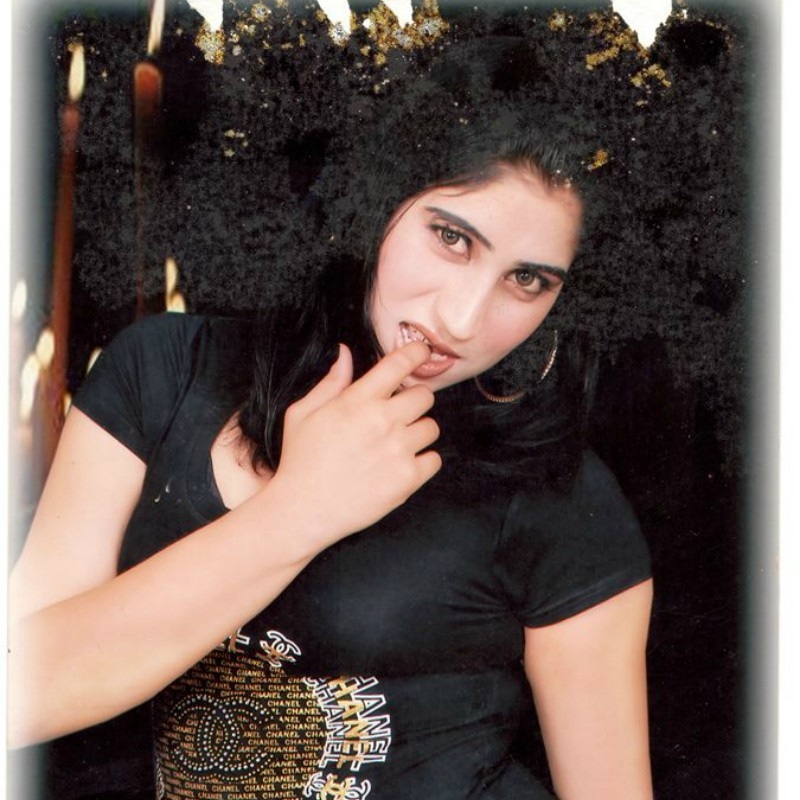A year later, Qandeel Baloch is remembered by the women who knew her best (Part 1)
Qandeel Baloch was a rebel, she did what she wanted to do. You may remember her from her viral clips on social media, her quirky outfits, maybe even her music video.
This weekend will be her first death anniversary. A year after her tragic demise, filmmaker Saad Khan is trying to remember her for the person she was, with stories about Qandeel's life from people who knew her best.
Talking to Images, Khan explained, "The press chooses to highlight things that sell, they like to portray working-class women in a certain way and even working-class men as savages. They just never focused on humanising her. These stories that we're telling, they come from the same people that were hounded by the media after her death but these questions were never asked, these memories were never shared."
"Everyone's been so fixated on her horrific death and understandably so but we just generally give more mileage to sensational news. These stories focus on who she was as a person."
These stories, that have been uploaded on a Facebook page called Qandeel Ki Kahani are excerpts from interviews conducted by Saad and documentary filmmaker Tazeen Bari with Qandeel's sister and mother and aim to highlight Qandeel's working-class life.
The page reads: “Qandeel Baloch successfully climbed the socio-economic ladder in a country where the class you're born into dictates who you are, what opportunities you'll get, and what you can do. She defied all that and became Pakistan's social media superstar. Rest in power, Qandeel (1990 - 2016)”
"These first-hand oral stories are immensely important. They provide correctives to the caricatured version of Qandeel we were so comfortable consuming without giving her any nuance and human agency," added Khan.
"Oral history gives voice to the narratives not privileged to be archived into the history books or reported by the media. They will always be questioned by those in power, but they don’t need any proof. For proofs are for the privileged, the unconsoled poor can just tell you what happened."
Qandeel Ki Kahani (Part I): Why is Qandeel a Baloch
Qandeel's sister: "I called her Fauzia. She changed her name to Qandeel Baloch after she joined the media. When I met her two years ago, I asked her why she had changed her name to Qandeel. She said that she changed her name because the people she worked with didn’t know she was a single woman working alone, that she didn’t have any support from her family.

She would say that people don’t know that I am actually alone, that only my parents are with me. That the rest of my relatives are not with me. They don’t know that. But if she told them her name was Qandeel Baloch, they’d assume she was a Baloch girl. This would make them think twice before saying anything to her, they’d be scared of saying anything to her if they thought she belonged to the Baloch family... it was only when people found out, when the media told everyone she isn’t a Baloch girl, that she’s from a poor family... Whatever happened to my sister, first it was Mufti Qawi, and then it was the media who caused my sister’s death."
Qandeel Ki Kahani (Part II): When Edhi Saab Brought a Lost Girl Back Home
Qandeel's sister: "Our mother wanted her girls to study. No girl in our family really went to school before. People would say to my father, ‘Look, your girls are going to study now.’ Then our relatives – my father’s relatives – would also admonish him for sending us to school. My father didn’t say anything, but our mother put her foot down and said no, her daughters would go to school. So we went.
Qandeel used to play with dolls. One day she was playing with her cousins and told them, ‘Tomorrow I am going to my grandmother’s house. That’s where I will get beautiful clothes for the dolls, and the clothes will be more beautiful than the ones you have.’ Our grandmother was a seamstress.
Next day after school she went to the bus station and got on a wagon [bus]. She was studying in Class 4, so she was probably 12 or 13.
She sat on the wagon without confirming which one it was, whether it was going to DG Khan or Multan. She just sat down and kept going. DG Khan passed her by or didn’t, we don’t know.
The wagon made a stop at the station in Multan, that’s where she got off. She didn’t know where she was. She was so young that she started crying. There was a shopkeeper sitting nearby watching her. He approached her, showed her some love, and asked her ‘Where do you want to go, child? Where are you from?’

She told him she was from Shah Dar Din, and that she wanted to go to her grandmother’s house in DG Khan. He told her she had accidentally come to Multan. She started crying even more. He took her to Edhi Home and left her there.
We were all so worried, we didn’t have mobile phones back then. At that time, you had to go from house to house to find someone. We kept looking for her, asking around. Four to five days passed. No one cooked in our house… our mother became hysterical, crying all day. She was thinking someone must have kidnapped her, got a hold of her. 'Where had Fauzia disappeared?' she would keep on saying.
Then, one day, at night it had rained heavily. Abdul Sattar Edhi – you have heard of him, right? – he brought Qandeel back.
We were all sitting around a fire inside, worried. That’s when he called out. He told us he had asked her [Fauzia] how she would get back home. She told him to take her to the village, from where she’d tell him the rest of the way. A wagon took them to the Shah Sadar Din stop. They got off there. She told Abdul Sattar Edhi, ‘Now that you’ve got me here, I’ll take you to my house.’ She called out to us from outside.
My father went outside. He came back with Fauzia and Abdul Sattar Edhi. It was very cold. My father – we were all really happy, wondering how she ended up with him. So then he told us. We asked her where she’d been. She told us that she had been on her way to grandmother’s house, to get clothes for her dolls, but then she didn’t know where she ended up.
My father had also put out an ad in the newspaper. That’s how he [Edhi] found out. He had also seen the ad with the address. We’d printed her photo.
That night he [Edhi] stayed with us, in our thatched room. We gave him iftari. Made chai and eggs, fed him. It was cold, his clothes were drenched so we gave him our father’s clothes. He wore them. In the morning, our father went and dropped him off to the wagon stop.
That was the first time Fauzia ever got onto a Hius [the van]. From that day on she was never allowed to go back to school anymore."
Edhi Saab and Qandeel passed away in 2016, a week apart. Qandeel's body was transported by Edhi Saab's ambulance team.
Qandeel Ki Kahani (Part III): Growing up in Shah Sadar Din
Anwar Bibi (Qandeel's mother): "It's not enough no matter how much you talk about her. There are so many stories. This is where her bed was. She took good care of me.
Here was placed the TV. Her books used to be on the TV table. Here used to be the electricity board. Everything was here. Her pillows, her bed, everything used to be here. We used to make food in this room too, morning and evening. All of us were living in this one room.
She'd remain busy in her studies. She was the school monitor. Class monitor. The teacher[s] wouldn't bother her. They'd say, "Fauzia is very clean. She comes in wearing well-ironed uniform every day. Her shoes are clean. Her socks all clean. Jacket's clean. Her gloves clean. Nothing is untidy."
If she got tired of watching TV, she'd study. If she got tired of studying, she'd say her prayers and read the Quran. She used to come [to the fields] whenever she felt like, to cut the grass, by her own choice. If she wasn't in school or studying, and [when] she felt like.
She'd say, "Maa, give me a sickle. I want to cut the grass." When she cut the grass, she'd cut her hand. When she cut wheat, she'd cut her hand again.

When I asked her to knead the flour, she'd mess up her hands. She'd say, "Maa, I just can't manage it." When I asked her to bake bread, she couldn't bake bread. She'd burn her hand instead. "Maa, I have burned my hand."
When I asked her to cook a dish, she'd burn her hand when stirring it. She'd say, "Maa, that's unfair. I am going to be a teacher."
I'd tell her to learn it at least. "You will get married and go to another house. Over there, wouldn't you bake bread for your husband?"
"I will not bake any bread for him. I will not marry," she would respond...
"Maa, I don't want to marry and don't you ever get me married."
More of Qandeel's stories will be published on our site tomorrow.





Comments